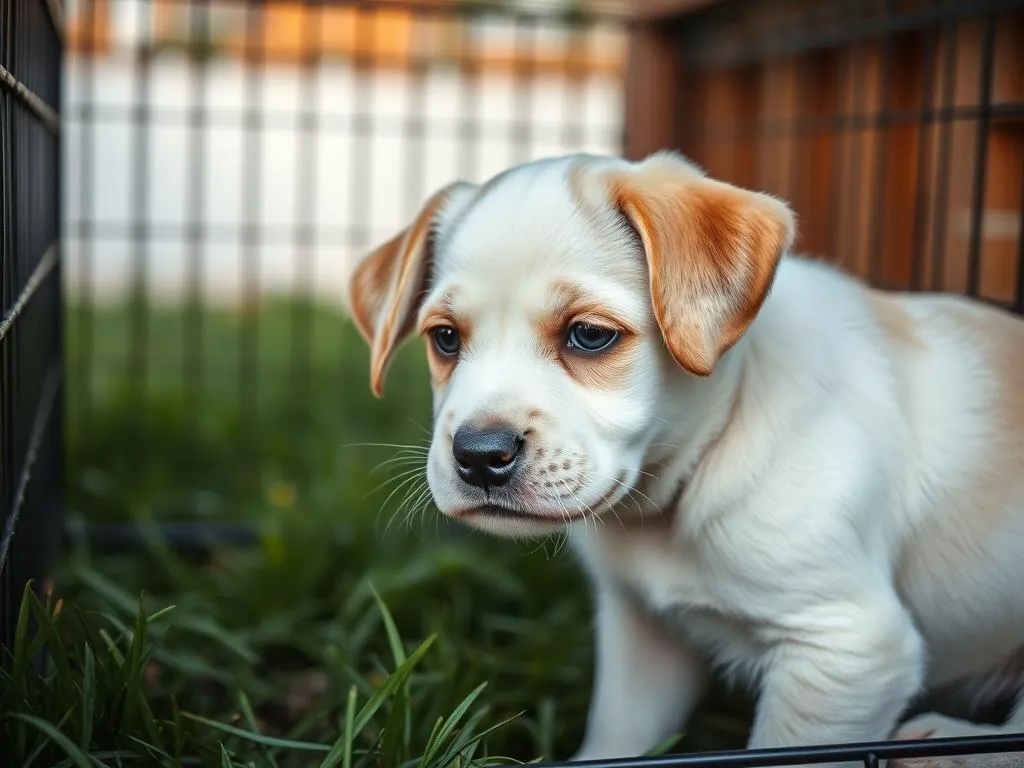
Understanding your puppy’s behavior is crucial for their health and overall well-being. One common issue many new pet owners face is the unfortunate problem of puppies peeing in their crates. This behavior can be alarming and frustrating, but it’s essential to approach it with patience and knowledge. In this article, we’ll explore the various causes behind this behavior, offer solutions for prevention, and discuss the health considerations that come into play.
Understanding Puppy Behavior
Natural Instincts
Dogs are den animals by nature. In the wild, they would seek out a small, enclosed space to feel safe and secure. A crate can mimic this environment, providing a sense of security for your puppy. However, it’s important to note that while puppies may appreciate the crate as a safe space, they do not instinctively understand that it should remain clean. Their natural instincts do not inherently include bladder control, particularly in younger puppies.
Potty Training Basics
The foundation of addressing the issue of why does puppy pee in crate begins with a solid understanding of potty training basics. Puppies, particularly those under six months old, often lack the bladder control required to hold their urine for extended periods. Establishing a consistent routine is vital. Take your puppy out for potty breaks after meals, playtime, and upon waking. This will help them learn when and where it’s appropriate to relieve themselves.
Signs of Stress or Anxiety
Puppies can be sensitive creatures. Stress or anxiety can manifest in various ways, including accidents in their crate. Look for signs such as excessive barking, whining, or attempts to escape the crate. If your puppy seems fearful or anxious when left alone, these feelings could lead to accidents. Understanding these behavioral cues is essential for appropriately addressing the problem.
Common Reasons for Crate Peeing
Age and Development
One fundamental reason puppies pee in their crates is their age. Young puppies have limited bladder control, typically being able to hold their urine for about one hour for every month of their age. A three-month-old puppy, for example, can usually hold it for about three hours. As they grow and develop, their ability to control their bladder will improve.
Health Issues
Medical conditions can also contribute to inappropriate urination. Urinary tract infections (UTIs), bladder stones, and other health problems can cause frequent urination or urgency. If you suspect a health issue—especially if your puppy is older than five months and still having accidents in their crate—consult your veterinarian for a thorough examination.
Inadequate Crate Training
Proper crate training is essential to prevent accidents. Many pet owners make mistakes during the training process, such as using the crate as a form of punishment or leaving their puppy in the crate for too long. A well-trained puppy should view their crate as a safe haven rather than a source of stress, which can greatly reduce the likelihood of peeing in the crate.
Length of Crate Time
Puppies have small bladders and need frequent potty breaks. If a puppy is confined to their crate for too long, they may not be able to hold it. As a general guideline, puppies can hold their bladder for approximately one hour for each month of age. Be attentive to how long your puppy is in the crate, and ensure they get regular potty breaks.
Fear of the Crate
If a puppy experiences fear or anxiety associated with their crate, they may resort to peeing as a response. Signs of fear can include cowering, trembling, or trying to escape. If your puppy exhibits these behaviors, it’s crucial to address their fear through positive reinforcement and gradual acclimatization to the crate.
Solutions to Prevent Crate Peeing
Establishing a Routine
Creating a consistent potty schedule can significantly reduce the chances of accidents in the crate. Take your puppy outside first thing in the morning, after meals, after playtime, and right before bed. This regularity helps them learn to associate specific times with potty breaks, making it less likely they’ll pee in their crate.
Proper Crate Training Techniques
Effective crate training involves more than just placing your puppy in a crate and expecting them to understand. Start by introducing your puppy to the crate gradually, allowing them to explore it without pressure. Use treats and praise to create a positive association with the crate. Over time, increase the amount of time your puppy spends in the crate, always ensuring they are comfortable and secure.
Creating a Comfortable Environment
Making the crate a comfortable space can help prevent accidents. Provide soft bedding and a few toys to keep your puppy entertained while inside. Ensure the crate is the right size—large enough for your puppy to stand, turn around, and lie down comfortably, but not so big that they have space to eliminate in one corner and sleep in another.
Monitoring Water Intake
Maintaining a balance between hydration and potty breaks is crucial. While it’s important for your puppy to stay hydrated, be mindful of their water intake, especially close to crate time. Limit water access about an hour before crating, and ensure they have had a chance to relieve themselves right before being placed in the crate.
Seeking Professional Help
If you find that your puppy continues to have accidents in the crate despite your best efforts, it may be time to consult a professional dog trainer or behaviorist. They can provide tailored advice and strategies to address your puppy’s specific needs. Professional guidance can be invaluable in resolving crate issues effectively.
Health Considerations
Recognizing Medical Issues
When addressing why does puppy pee in crate, it’s essential to be aware of potential medical issues. Signs of urinary tract infections include frequent urination, straining to urinate, or blood in the urine. If your puppy exhibits these symptoms, seek veterinary assistance promptly. Early intervention can prevent further complications and ensure your puppy’s health.
Regular Vet Check-ups
Routine veterinary visits play a vital role in maintaining your puppy’s health. These visits allow for vaccinations, parasite control, and general health assessments. Discuss any concerns regarding your puppy’s urination habits with your veterinarian, who can help determine if there are underlying medical issues.
Understanding Puppy Nutrition
Nutrition can impact your puppy’s overall health, including bladder control. A balanced diet is essential for their development and well-being. Certain ingredients or feeding schedules can influence how often your puppy needs to relieve themselves. Consult your veterinarian regarding the best diet for your puppy’s age and health requirements.
Conclusion
Addressing the question of why does puppy pee in crate requires an understanding of puppy behavior, training techniques, and health considerations. Recognizing the natural instincts of puppies, implementing consistent potty training methods, and creating a comfortable environment are critical steps in preventing accidents. Additionally, being mindful of your puppy’s health and nutrition will contribute to their overall well-being.
With patience, understanding, and the right strategies, you can successfully manage and resolve crate issues, leading to a happier and healthier relationship with your puppy. Remember, this journey takes time, and each step you take brings you closer to a well-trained and confident canine companion.









